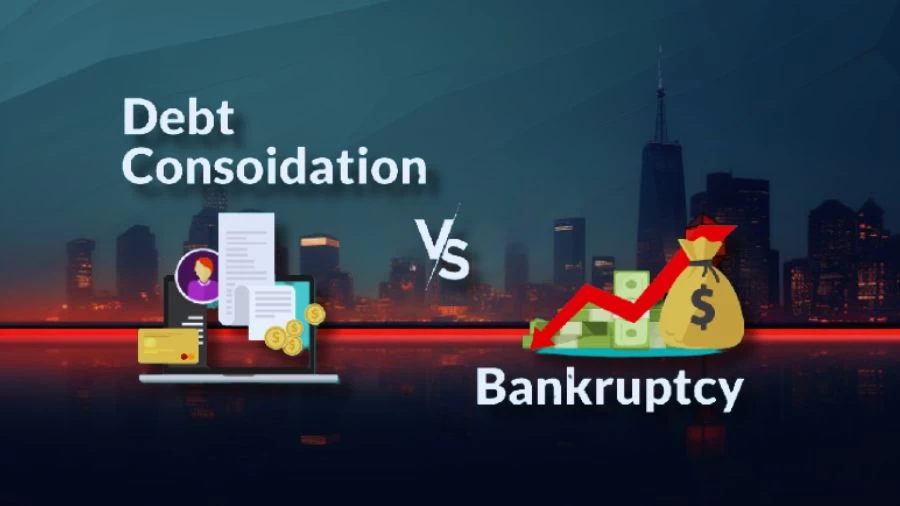
Bankruptcy vs Debt Consolidation, Is Debt Consolidation the Same as Bankruptcy?
Bankruptcy offers debt elimination with severe credit impact, while debt consolidation restructures debts for manageable payments without debt forgiveness; they are not the same, serving distinct purposes in managing overwhelming debt.
Updated Dec 19, 2023
On This Page
- Bankruptcy Vs Debt Consolidation
- What is the Difference Between Bankruptcy Vs Debt Consolidation?
- Is Debt Consolidation the Same as Bankruptcy?
- What Does Debt Consolidation Mean?
- What Does Bankruptcy Mean?
- How Does Bankruptcy and Debt Consolidation Impact One's Credit?
- What Are the Pros and Cons of Debt Consolidation Compared to Bankruptcy?
- Is It Better to Opt for Bankruptcy or Debt Consolidation?
Bankruptcy Vs Debt Consolidation
Bankruptcy and debt consolidation represent two different approaches to tackling overwhelming debt. Debt consolidation is a practical option for individuals dealing with manageable but burdensome debt spread across multiple accounts.
This strategy involves combining various debts into a single, more manageable payment, often with a lower interest rate. While debt consolidation might have a temporary impact on credit scores, it provides an opportunity for individuals to simplify their repayment process and potentially improve their overall financial situation.
On the other hand, bankruptcy is a more drastic solution reserved for those facing insurmountable debt with no feasible repayment strategy. While bankruptcy offers a more significant reduction in debt, it comes at the cost of a severe and long-lasting negative impact on one's credit score. It is generally considered a last resort for individuals who have exhausted all other options and have no viable means to repay their debts.
Choosing between debt consolidation and bankruptcy depends on the severity of one's financial predicament and their willingness to endure the potential credit consequences associated with each option.
What is the Difference Between Bankruptcy Vs Debt Consolidation?
The difference between bankruptcy and debt consolidation lies in their approach to managing debt. Bankruptcy offers debt elimination but with severe credit repercussions, while debt consolidation focuses on restructuring debt for more manageable payments without debt forgiveness.
|
Aspect |
Bankruptcy |
Debt Consolidation |
|
Purpose and Method |
Eliminates or reduces debts through legal process |
Combines multiple debts into one for easier management |
|
Impact on Credit |
Severe negative impact, long-lasting (7 to 10 years) |
Moderate impact, potential long-term credit improvement |
|
Debt Reduction |
May significantly reduce or eliminate debt |
Does not reduce the total debt amount |
|
Assets and Property |
May involve selling non essential assets (Chapter 7) |
No sale of assets or property |
|
Types of Debts Addressed |
Addresses both unsecured and secured debts |
Typically used for unsecured debts (e.g., credit cards) |
|
Federal Protections |
Offers certain federal protections and relief options |
No federal protections, a private financial arrangement |
|
Fees and Costs |
Involves legal fees and court costs |
May involve fees for obtaining new loans or credit cards |
|
Eligibility Criteria |
Eligibility varies based on income and assets |
Available to individuals with multiple loans and good payment history |
|
Timeline for Debt Resolution |
Varies but can be several months to years |
Typically involves a structured repayment plan |
|
Credit Card Usage After Debt Resolution |
Often limited or restricted during bankruptcy |
Generally permitted but should be used responsibly |
|
Federal Student Loans Impact |
Can affect eligibility for federal student loan aid |
May lose federal protections by consolidating into private loans |
Is Debt Consolidation the Same as Bankruptcy?
No, debt consolidation and bankruptcy are not the same. They represent distinct approaches to addressing financial debt. Bankruptcy is a legal process resulting in the discharge of debts but comes with potential asset surrender and significant negative credit implications.
In contrast, debt consolidation entails obtaining a new loan to combine multiple debts into a single monthly payment, streamlining repayment without eliminating the debt entirely.
Debt consolidation, if managed well with timely payments, can have a more neutral or even positive impact on credit, making it a less drastic solution than bankruptcy. The decision between these options should be based on individual financial circumstances and goals.
At MarketsHost, you'll find a treasure trove of resources dedicated to the complexities and nuances of Finance, empowering you to navigate this domain successfully.
What Does Debt Consolidation Mean?
Debt consolidation is a financial strategy that entails consolidating various existing debts into a single, more manageable form of credit. Although it doesn't eliminate the debt, it simplifies the repayment process by securing a new loan or repayment plan at a potentially lower cost.
This could involve obtaining a personal loan, a home equity loan, utilizing a balance transfer credit card, or entering a debt management plan with a credit counseling agency. The objective is to streamline financial obligations, decrease interest expenses, and regain control over debt, paving the way for a more stable and potentially debt-free financial future.
What Does Bankruptcy Mean?
Bankruptcy is a legal process with dual objectives. On one hand, it provides individuals and businesses drowning in debt an opportunity for a fresh financial start by either wiping out their outstanding debts entirely or devising a structured repayment plan spanning three to five years.
On the other hand, it comes with a significant drawback, as a bankruptcy filing can cast a shadow on one's credit report for up to a decade, making it considerably harder to secure new loans or lines of credit.
It's crucial to recognize that not all types of debts are eligible for discharge through bankruptcy; obligations like back child support, alimony, unpaid taxes, and often student loans, remain untouched by the bankruptcy process, leaving individuals or entities responsible for their repayment.
Also Read>> How Much Does It Cost to File Bankruptcy?
How Does Bankruptcy and Debt Consolidation Impact One's Credit?
Bankruptcy and debt consolidation have distinct impacts on an individual's credit. Bankruptcy, whether it's Chapter 7 or Chapter 13, leaves a significant and enduring negative mark on your credit report, with Chapter 7 remaining for ten years and Chapter 13 for seven years.
This makes it challenging to secure new credit and often results in less favorable terms when you do. On the other hand, debt consolidation can either positively or neutrally affect your credit.
When managed responsibly, it can lead to credit score improvement over time by simplifying your debt and making it easier to handle, potentially resulting in more favorable financial prospects. However, the choice between bankruptcy and debt consolidation should be made carefully, considering individual financial circumstances and goals.
Read More>> How to Consolidate Student Loans?
What Are the Pros and Cons of Debt Consolidation Compared to Bankruptcy?
Debt consolidation and bankruptcy are two financial strategies individuals consider when facing overwhelming debts. Debt consolidation involves combining multiple debts into a single payment, while bankruptcy is a legal process that can discharge or restructure debts. Each approach has its pros and cons, and understanding them is crucial for making informed decisions about managing financial challenges.
Debt Consolidation
Pros of Debt Consolidation
- Debt consolidation typically protects your credit score as long as you make timely payments on the new loan or credit line.
- It can lead to a reduction in the overall interest paid on your debts, potentially saving you money in the long run.
- Consolidation reduces the number of monthly payments, making it easier to manage your finances.
- The process is often completed within months, offering relatively rapid debt relief.
- Debt consolidation can often reduce your total debt balances over time.
Cons of Debt Consolidation
- Debt consolidation requires consistent, ongoing payments, and you must adhere to the terms of the new loan or credit line.
- It may not be a viable option for those with lower credit scores, as they may struggle to qualify for favorable consolidation terms.
- Some consolidation methods, such as home equity loans, may require collateral, risking your assets if you can't repay.
Chapter 7 Bankruptcy
Pros of Chapter 7 Bankruptcy
- Chapter 7 bankruptcy allows for the complete discharge of dischargeable debts without further payment.
- The automatic stay provision in Chapter 7 can immediately stop collections, foreclosures, and garnishments, providing immediate relief.
- Chapter 7 bankruptcy is often completed relatively quickly, typically within a few months, providing a fresh financial start.
Cons of Chapter 7 Bankruptcy
- Qualification for Chapter 7 bankruptcy is subject to means testing, which may require you to demonstrate financial need.
- Nonexempt assets may be liquidated to repay creditors, potentially resulting in the loss of valuable possessions or property.
- Chapter 7 bankruptcy can have a significant negative impact on your credit, affecting it for up to 10 years.
Chapter 13 Bankruptcy
Pros of Chapter 13 Bankruptcy
- Chapter 13 bankruptcy offers a structured plan to repay debts over a period of 3 to 5 years.
- It allows you to retain nonexempt assets like a home or car while repaying creditors over time.
- Like Chapter 7, Chapter 13 also provides an automatic stay to stop collections, foreclosures, and garnishments.
Cons of Chapter 13 Bankruptcy
- Chapter 13 involves ongoing payments over an extended period, typically 3 to 5 years, which can be challenging for some individuals.
- While less severe than Chapter 7, Chapter 13 bankruptcy can still have a negative impact on your credit, affecting it for up to 7 years.
- Borrowers must adhere to a strict repayment plan established by the court, leaving less flexibility in their financial decisions.
Is It Better to Opt for Bankruptcy or Debt Consolidation?
When deciding between bankruptcy and debt consolidation, it's essential to weigh your financial circumstances and goals carefully. In most cases, opting for debt consolidation is the wiser choice, as it allows you to retain control of your assets and credit rating while simplifying debt management.
Debt consolidation, achieved through a new loan or credit card with lower interest rates, is viable if you can qualify for it and manage your debts responsibly. However, if you find yourself in a situation where there's no feasible way to repay your debts, bankruptcy might be the necessary path to provide a fresh financial start, albeit with more severe and longer-lasting consequences for your credit score. Consulting
Bankruptcy vs Debt Consolidation - FAQs
1. What is the main difference between bankruptcy and debt consolidation?
Bankruptcy eliminates or reduces debt through a legal process, while debt consolidation combines multiple debts into one for easier management.
2. How does bankruptcy impact my credit compared to debt consolidation?
Bankruptcy has a severe and long-lasting negative impact on your credit, while debt consolidation has a moderate impact with potential long-term improvement.
3. Can I use credit cards after debt consolidation or bankruptcy?
Generally, credit card usage is permitted after debt consolidation but may be limited or restricted during bankruptcy.
4. Are there federal protections associated with bankruptcy or debt consolidation?
Bankruptcy offers certain federal protections, while debt consolidation is a private financial arrangement without federal protections.
5. What types of debts can be addressed through bankruptcy and debt consolidation?
Bankruptcy can address both unsecured and secured debts, whereas debt consolidation is typically used for unsecured debts like credit cards.




